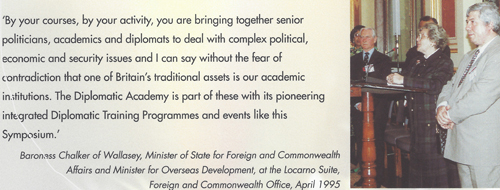Diplomatic Practice and consequently, Diplomatic Training, must keep abreast in our rapidly evolving world.
News!
In September 2024, Professor Nabil Ayad , Director of the Global European Diplomatic Academy (GEDA), together with a team of academics, experts and professionals who have a proven track record in running Master’s Degrees, executive programmes
and training courses for members of the Diplomatic Corps in London, Paris and Rome, staff of overseas Ministries for Foreign Affairs and other government departments
international and regional organisations as well as graduates aspiring to an international career, will lead the introduction of an MBA in Diplomacy
The unique and innovative MBA Diplomacy will be offered by the University of Europe for Applied Sciences in Berlin, Germany and Dubai, United Arab Emirates.
Training Activties and Webinars - 2020 - 2023
1. Acted either as convenor or contributed to a
number of online Webinars which were organised either by embassies in
London, universities or international organisations:
•
The New Communications Reality Shaping Global Society: Webinar organised by Embassy of Turkmenistan - 3rd December 2020.
Gave a presentation on
Positive Diplomacy and Foreign Policy Neutrality
• Acted as a convenor: Science Diplomacy, International Policy, and the Move from the Wealth of Nations to the Health of Nations. An international webinar which was organised by the Embassy of Nepal, London, 26th November 2020.
2. Assisted in the organization of the Online Education without Social Distance: Challenges for Internationalisation and Culture of Peace Online Conference. The conference was Organised by Pegaso International, Malta in cooperation with European Universities and Organisations including UNESCO (United Nations Educational, Scientific and Cultural Organization). Acted as a Discussant in the Panel: Education for a Culture of Peace , 23–24 October 2020
3.Acted as a convenor: Culture, Science, Diplomacy and International Relations.An international webinar hosted by International Institute for Cultural Diplomacy, United Arab Emirates 22 September 2020
The event was overseen by Professor Daryl Copeland, Senior Fellow at the Canadian Global Affairs Institute, and Policy Fellow, Centre for International Studies and Research - Field of Computer Vision and Artificial Intelligence Reserch (CERIUM) author of Guerrilla Diplomacy: Rethinking International Relations
4.Acted as a convenor: The Impact of the Social Media and Fake News on Cultural Diplomacy,
given by Professor Richard Harvey who is Professor, School of Computing
Sciences and the Academic Director of Internationalisation
at University of East Anglia,
Norwich Research Park,
Norwich, UK
5. Assisted with the organisation of an international webinar in June 2020 hosted by the International Institute for Cultural Diplomacy, United Arab Emirates, whose mission, according to Dr Mohammad Kamil Almuaini,
Founder/Chairman is to help people foster a mutual understanding of cultural differences. My pesentation to the webinar Science Diplomacy, International Policy and Solidarity
in the Age of Fear was given on 9 July 2020.
6.Assisted with the organisation of an
International Webinar : Solidarity in COVID-19 – An Essential
Instrument in Tracking the Pandemic . Hosted by Abdulaziz Saud Al
Babtain Cultural Foundation which references the Paris Agreement and the
UN Sustainable Development Goals (SDGs). The report points out that
2020 is a landmark year – the “Year of Biodiversity”and the fifth
anniversary of the Paris Agreement. The foundation asks for countries to
ratchet up their Nationally Determined Contributions (NDCs), which
until today are insufficient to reach the Paris Agreement goals. I gave
a presentation on: Diplomacy, Security, NationBranding and Statecraft
7.Acted as a Convenor: International Security & the New Disorder: An Emerging Paradigm in Cultural Diplomacy
An international webinar hosted by International Institute for Cultural
Diplomacy, United Arab Emirates. The introductory seminar was
presented by Professor Roger McNally on 25 June 2020.
8.Acted as a Discussant: The Impact of COVID 19 on Diplomatic Training,
a webinar hosted by the Academy for Diplomatic Studies, Ministry of
Foreign Affairs, Kingdom of Bahrain. Participants included members of
the International Forum on Diplomatic Training 09 June 2020
9.Acted as a Convenor: The Role of Cultural Diplomacy in Times of Crisis.
Major presentation given by Dr Myszka Guzkowska, Higher Education
Consultant, London, United Kingdom. An international webinar hosted by
the International Institute for Cultural Diplomacy, United Arab Emirates, 11 June, 2020
10.Acted as a Convenor: The Impact of Cultural Diplomacy on Nation Branding and Statecraft, given by Barry Tomalin . An international webinar hosted by International Institute for Cultural Diplomacy, United Arab Emirates
26 May 2020. Barry Tomalin lectures in International Communication and
Public Diplomacy at the British School of Leadership and Management,
Glasgow Caledonian University London and Birkbeck College, University of
London
11.Gave a presentation on: The Dynamics of Diplomacy, National Interests and Performance Assessment to the members of the Institute of International Relations, The Ministry of Foreign Affairs of Turkmenistan and the students of the University of Humanities and Development. 21 May 2020
12. Gave a presentation on; Diplomacy, Practice Procedures and Dynamics to students from University of Tirana, Faculty of Social Sciences, 14 May 2020
Diplomatic Practice and consequently, Diplomatic
Training, must keep abreast in our rapidly evolving world. Please see a
copy of my recent article on Science Diplomacy and Diplomatic Practice which was published by Diplomat Magazine, May/June 2019 >>
As a result of my lengthy academic career with
extensive links to world governments and international and regional
organisations; as well as contacts with thousands of alumni who occupy
senior positions in governments, professional organisations,
universities, and national parliaments, I have been approached by a
number governments to establish to establish national diplomatic
academies for the training of their Diplomats and other government
officials.
When I started the Diplomacy programmes at the University of Westminster in 1980 and later set up the Diplomatic Academy of London,
Diplomacy was a minor branch of international relations; due to my
efforts and innovative training, Diplomacy became a discipline unto
itself. Hence, I was approached by the University of East Anglia in August 2010 to set up the London Academy of Diplomacy at their London campus, followed by Loughborough University London in November 2014 to set up the Academy of Diplomacy and International Governance (Renamed recently as Institute of Diplomacy and International Governance).
In August 2018, I joined Glasgow Caledonian University London (GCU London) >>,
initially to supervise a number of my former PhD students who
transferred from Loughborough University. GCU London was keen to
introduce Diplomacy programmes to serve the needs of governments,
organisations, and graduates aspiring for an international career. As a
result, I have developed three Master’s Degree programmes at the British School of Leadership and Management (GCU London) which are currently being offered. These include:
1. MSc International Diplomacy and the Digital State Information about programme >>
2. MSc International Security and Diplomacy Information about programme >>
3. MSc International Business, Trade and Diplomacy Information about programme >>
Recent Doctorate Degrees which I have supervised and examined:
Supervised
the following four PhD theses by students who were registered
initially at Loughborough University London and transferred afterwards
to Glasgow Caledonian University London where they were awarded the PhD
Degree
1. Thesis entitled: Diplomacy and Security: An Analysis of
the Response to Emerging Security Threats in the MENA Region Post- Arab
Spring (2010-2017): United Arab Emirates , a Case Study , by Dr Abdulla Bin Ahmed Al Shaikh 23 August 2019 . Sponsored by Dubai Police.
Programmes at the University of Westminster in 1980 and later set up the Diplomatic Academy of London,
Diplomacy was a minor branch of international relations; due to my
efforts and innovative training, Diplomacy became a discipline unto
itself. Hence, I was approached by the University of East Anglia in August 2010 to set up the London Academy of Diplomacy at their London campus, followed by Loughborough University London in November 2014 to set up the Academy of Diplomacy and International Governance (Renamed recently as Institute of Diplomacy and International Governance).
Tirana, Albania November 21st, 2019 'Relgion as an Instrument for Peace' Conference
'Relgion as an Instrument for Peace' Conference in Tirana,
Albania. His Excellency Ilir Meta, President of Republic of Albania
and Ambassador Sam Brownback Ambassador at Large for Religion Freedom,
Department of State as well as Ambassador Genci Mucaj, Advisor for
International Affairs to the President of Albania gathered participants
from all parts of the world. "World Religions teach the spiritual
value of duty to care for others. This belief comes from: the
African tradition, the Moslem obligation of hospitality, the Christian
“golden rule,” and similar beliefs in other religions. Yet, it is quite
ironic that the source of much world conflict is at least in part
based on differing interpretations of religious text and conflicting
religious claims on ownership of lands. Religion is frequently
blamed in many world conflicts including Kosovo (Christianity and
Islam), Bosnia (Catholicism; Orthodox Christianity; Islam), India
(Hinduism and Islam), Israel (Judaism, Christianity and Islam), Sri
Lanka (Buddhism and Hinduism), and Ireland (Catholic and Protestant
Christianity). However, the root causes of these conflicts are much more holistic.
They involve: tribal or racial enmity, economic disparity, and
political differences. It can be noted that although, on the one hand,
certain religious leaders sometimes sanctify wars making violence
“holy”, on the other, the most persistent voices for non-violence come
from religions."

Professor Nabil Ayad(l) His Excellency Ilir Meta, President of Republic of Albania(r)
The Hague, Netherlands, June 13th, 2019.
The World Forum for the Culture of Peace with speakers calling for the
promotion of culture and dialogue for global peace and security through
education. George Vella, President of Malta gave the keynote address
stressing Education for Peace. Organized by the Al-Babtain Cultural
Foundation in partnership with the World Peace Foundation of New York,
Leiden University in the Netherlands, the International Committee of the
Red Cross and the Carnegie Foundation Peace Palace. (Photos: Session I
of the World Forum for the Culture of Peace and Professor Nabil Ayad
with HE Dr. George Vella, President of Malta
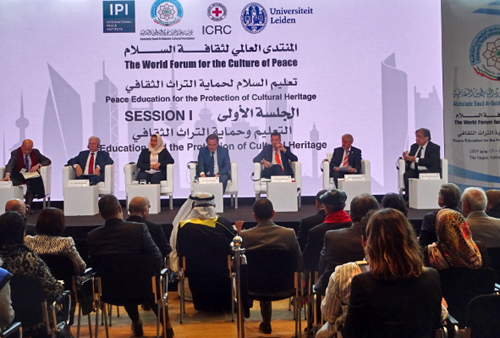
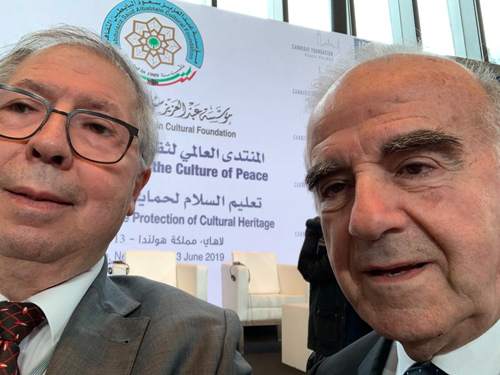
In February, 2019, I organized the 25th International Conference in the series Diplomacy in the 21st Century in Abu Dhabi, UAE in collaboration with the International Institute for Cultural Diplomacy (IICD).
The Conference was entitled: "The New Nexus 2: The Impact of the Media
on Diplomacy, Security, Nation Building and Statecraft: Image
Projection and Reputation Management ."
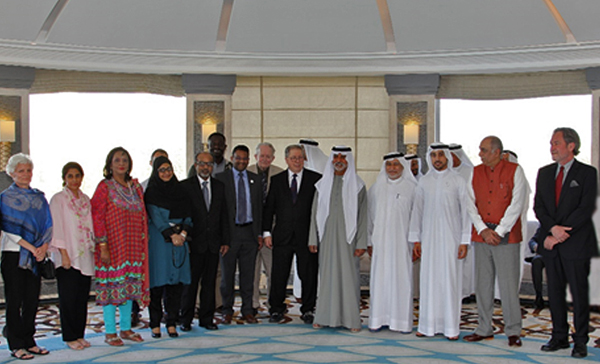
Professor
Nabil Ayad and conference participants with His Highness Sheikh Nahyan
bin Mubarak Al Nahyan, Minister of Tolerance February, 2019
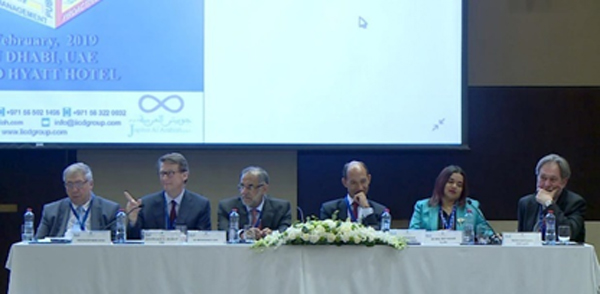
Plenary
Session III - Ambassadorial Panel (l-r) Professor Nabil Ayad,
Ambassador James Watt CVO, Chairman, Council for British Research in the
Levant, former British Ambassador to Egypt, Jordan and Lebanon; H E Mr
Navdeep Suri , Ambassador of India to UAE; Ambassador Michael Corbin.
former American Ambassador to UAE; HE Mrs Iruthisham Adam, former
Minister of Youth and Sports, Republic of Maldives and Ambassador to the
UN Office of International Organisations, Geneva; and Professor Daryl
Copeland, Senior Fellow at the Canadian Global Affairs Institute; former
Senior Advisor, Strategic Policy and Planning, Department of Foreign
Affairs and International Trade, Canada
In addition, I am acting as an external
diplomatic adviser to HE Mr. Behgjat Pacolli - First Deputy Prime
Minister and Minister of Foreign Affairs of the Republic of Kosovo.
IIn May 2018, in Kosovo, I organised the 24th International Conference in the series Diplomacy in the 21st Century in collaboration with the Kosovo Diplomatic Academy and Friedrich-Ebert-Stiftung on "Economic Diplomacy - Regional Cooperation and Integration Through the Berlin-Process".
This 5th Kosovo Diplomatic School Conference was held at Hotel Queen Vali Palace, Gjilan, Republic of Kosovo, 06-10 May 2018.


In March 2018, in Kosovo, Professor Dr Nabil Ayad organised the conference on: Diplomacy, Gender Empowerment and Nation Building in collaboration with Kosovo Diplomatic Academy. The
conference coincided with the International Women’s Day and the
celebration of the 5th anniversary of establishing the Kosovo
Diplomatic Academy. It was the 23rd International Conference in the series of Diplomacy in the 21st Century.
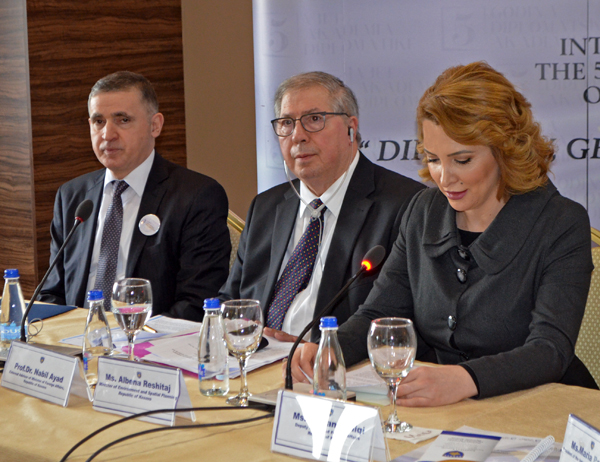
H E Prof. Dr. Beqir Ismaili, Professor Dr. Nabil Ayad, H E Dr Albena Refki Reshitaj – Minister of Environment and Spatial Planning who spoke about Diplomacy and Gender
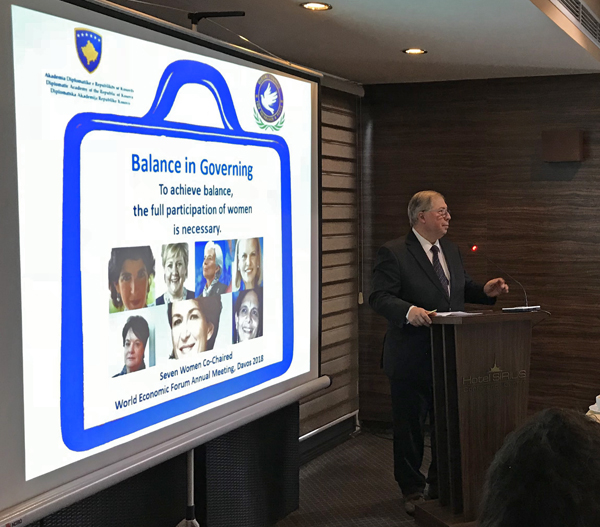
Professor Dr. Nabil Ayad spoke on "Empowering Women in Government: Diplomatic Challenges"
Professor Dr. Nabil Ayad addressing the conference (MP4) >>
________________________________
Website for Global Council for Tolerance and Peace (GCTP) >> gctpnews.org
Launch of GCPT in Republic of Malta, November 2017
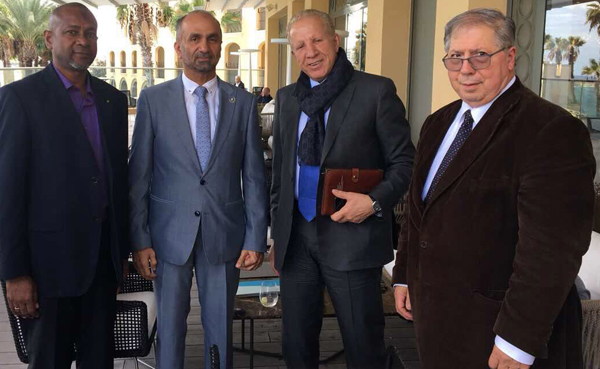
(l-r) HE Bourhane Hamidou, President of the National Assembly
of Comoros; Ambassador Ahmed al-Jarwan, President Global Council for
Tolerance and Peace;
HE Mr. Behgjat Pacolli, First Deputy Prime Minister and
Minister of Foreign Affairs Republic of Kosovo; Professor Nabil Ayad,
Assistant for Diplomatic and Academic Affairs to the President GCTP

Launch of GCPT in Republic of Malta, November 2017
Football for Peace, UK House of Commons on November 8th, 2017
Another notable enterprise in which I am currently involed is Football for Peace
which was launched at the UK House of Commons on November 8th, 2017. I
was appointed to the Steering Committee for this renowned organisation.
Launch of London as City for Peace at UK House of Commons on November 8th, 2017
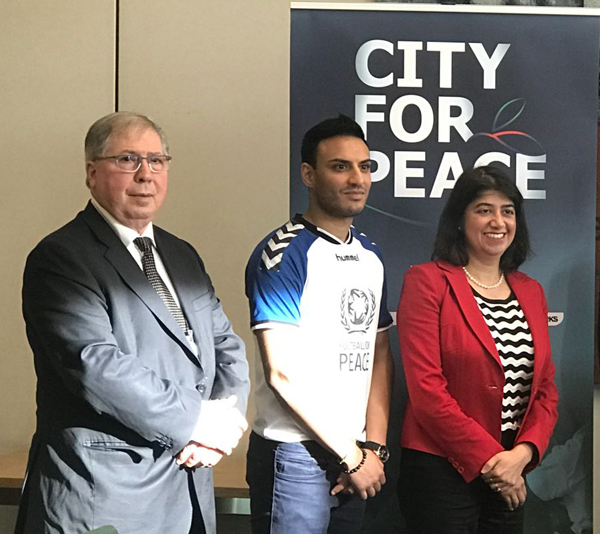
(l-r)Professor Nabil Ayad, Assistant for Diplomatic and
Academic Affairs to the President GCTP; Mr Kashif Siddiki, Chairman,
Football for Peace ;
Ms Seema Malhotra, MP
Past Academic Achievements
As founder and former Director (November
2014-October 2017) of the Academy of Diplomacy and International
Governance at Loughborough University London, I worked to develop the
Academy as a recognised international institution. The aim of the
Academy was to offer a suite of Master’s Degrees in Diplomacy and
related disciplines.
My career has been a study in questioning
conventional approaches while embracing global education. My greatest
success has been the integration of theoretical and practical concepts
using innovative and creative approaches. When I developed the
Diplomatic Academy of London (DAL) at the University of Westminster and
later the London Academy of Diplomacy (LAD) at University of East
Anglia, London Campus, as well as their satellite centres in Paris and
Rome, I created a new model for university education for professional
diplomats, other government officials, and graduates aspiring for an
international career.
The Vision of Geodiplomatics
This site is dedicated to Sir Peter Marshall, KCMG, who is recognized as the master of geodiplomatics. In his book entitled Positive Diplomacy,
as well as in his lectures and seminars, he discusses the evolution
of diplomacy. He describers a major shift in the practice of diplomacy
towards a public model which he referes to as geodiplomatics.
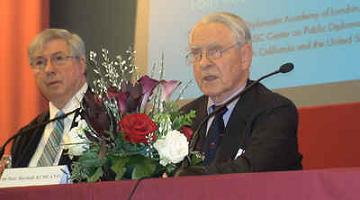
[l-r
] Professor Nabil Ayad and Sir Peter Marshall Introducing the concept
of 'Geodiplomatics' in the context of the conduct of International
Relations, at the 16th Diplomatic Academy of London Symposium entitled
Transformational Public Diplomacy: Shaping the Future of International
Relations, May 2008
Diplomacy is a business, a multinational business. It is as
dynamic as the policies of the country it serves. If it gets out of
tune with the realities of the day. it will fail.
But it cannot afford to follow changing fashion
light-heartedly. It must temper experience and accumulated expertise
with imagination and receptiveness. Sir Peter Marshall . The Dynamics of Diplomacy

This site is also dedicated to many people with
whom I have worked both academics and administrative staff.
These include Senior officials at the University of Westminster
for supporting the Diplomatic Academy of London, including: Professor
Colin Adamson-Maceda, Professor Terence E. Burlin, Dr. Geoffrey Copland,
Professor Margaret Blunden, Professor Keith Phillips, Professor
Geoffrey Petts. Professor Rikki Morgan-Tamosunas, and Dr Myszka
Guzkowska. As well as many colleagues for their valuable contribution
including: Mr. Stanley Martin CVO, Sir David Miers KBE CMG, Professor
Riad Nourallah, Professor Daryl Copeland, Mr. David Rees, Mrs Rosalie
Rivett, Mr. Abdel-Ilah Bennis, Mr. Rob Williams, Professor Jack
Lonergan, Professor Michael K. Simpson (President of the American
University of Paris, and Professor Ali Fatemi

In addition, many officials from the University
of East Anglia, including the Vice-Chancellor Professor Edward Acton,
the Dean of UEA London Dr. Richard Harvey , Professor Hussein Kassim,
and staff of INTO University Partnerships, including its Chairman Mr.
Andrew Colin. and Mr. Martin Halsall, as well as His Exellency.
Professor Vincenzo Scotti (President of LINK Campus University in Rome).
Special thanks and appreciation go to Mrs.
Fatmah Lallmahamood for her dedication and exemplary service for more
than fifteen years.
It is also dedicated to thousands of Alumni who have studied at the Academies.
The Standing of the Academy
In May 2008, the Diplomatic Academy of London,in
colaboration with the American Embassy in London and Centre on Public
Diplomacy, University of Southern California, organized the Sixteenth
International Symposium in the series Diplomacy in the 21st Century. The
theme was
Transformational Public Diplomacy: Shaping the Future of
International Relations During the Symposium Reception which was
hosted by Professor Geoffrey Petts, Vice- Chancellor and Rector,
University of Westminster & Professor Nabil Ayad, Director,
Diplomatic Academy of London comments were made about the standing of
the Academy.
Diplomacy in the 21st Century: Sixteenth International Symposium: Closing Dinner >>
Evolution in the Study of Diplomacy
When I started the diplomatic studies programme
at the University of Westminster in 1980, Diplomacy was a minor branch
of International Relations. Through my efforts and determination,
Diplomacy has become a discipline unto itself, and my work at the
Academies has been recognised for leadership in the field.
Over more than three decades. I have been involved in the
training of diplomats (including heads of diplomatic missions) and other
government officials from the Commonwealth, the Arab World, Africa,
Eastern and Central Europe, the Caribbean, Central Asia and China. Most
of these training programmes were sponsored by the British Foreign and
Commonwealth Office and the British Council, as well as groups who were
sponsored by their own governments. These include China, Kuwait, Iraq,
the UAE, Tanzania, Swaziland and Saudi Arabia.
In addition, I have advised governments on setting up institutes
for diplomatic training and lectured extensively, at various Ministries
of Foreign Affairs, Diplomatic Training Institutes and universities in
many countries, including, Australia, Russia, Austria, Jordan, Qatar,
Egypt, France, Italy, Malta, Kazakhstan, United Arab Emirates,
Indonesia, Croatia , Poland ,Thailand, Malaysia, Spain, Uzbekistan,
Italy, China, USA, Germany and in the UK (Universities of Birmingham,
Reading and Salford). The areas covered have included such relevant
topics as: international security, international relations, and the
media and the impact of information technology on Diplomatic Missions
and Government Departments.
Diplomatic courses and training programmes
offered have been valued by the Foreign and Commonwealth Office, British
Ministry of Defence, overseas Ministries for Foreign Affairs,
Diplomatic Missions in London, international and regional organisations,
multinational corporations and individual students for their relevance
and focus on career development.
Many of the diplomats for whom I have developed training
programmes occupy senior positions in their countries as Ministers
and Ambassadors; others are working as members of staff for
international and regional organisations such as the UN, NATO, EU, the
League of Arab States, the media, multinational corporations, defense
and security organisations.
